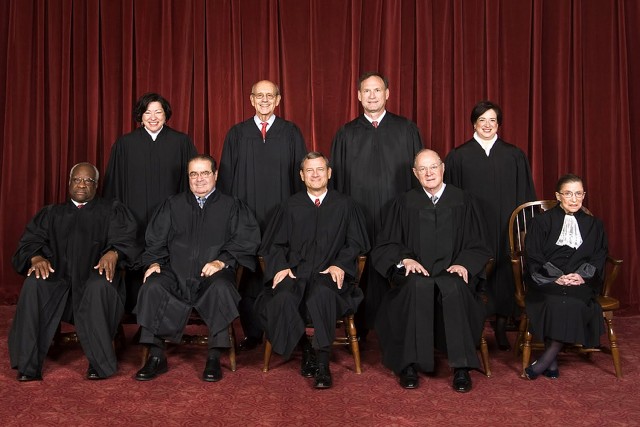Supreme Court Unanimously Strikes Down Free Speech “Buffer Zones”
First Amendment upheld against Massachusetts law involving abortion clinic protests

While the long-awaited Hobby Lobby decision won’t come until next week, the United States Supreme Court did issue a couple interesting rulings today.
In yet another unanimous decision this session, the Court reversed the First Circuit Court decision in McCullen v. Coakley.
At issue in McCullen v. Coakley was whether the First Circuit erred in upholding Massachusetts’s “selective exclusion law” – which made it a crime for speakers other than abortion clinic workers to “enter or remain on a public way or sidewalk” within 35 feet of an entrance, exit, or driveway of “a reproductive health care facility.”.
The Court holds that the Massachusetts law violates the First Amendment. This is a law that imposes a thirty-five-foot buffer zone around abortion clinics.
According to SCOTUSblog, the decision is relatively narrow.
The Court makes clear that states can pass laws that specifically ensure access to clinics. It holds that states cannot more broadly prohibit speech on public streets and sidewalks. It also notably rejects the protesters’ broadest arguments that such restrictions require strict constitutional scrutiny and are viewpoint based.
The upshot of today’s ruling is that an abortion clinic buffer zone is presumptively unconstitutional. Instead, a state has to more narrowly target clinic obstructions. For example, the police can tell protesters to move aside to let a woman through to the clinic. But it cannot prohibit protesters from being on the sidewalks in the first instance. If in practice protesters still are obstructing the entrance, then it can consider a broader restriction.
Alliance Defending Freedom attorney Mark Rienzi, professor of constitutional law at Catholic University of America’s Columbus School of Law and lead counsel in McCullen v. Coakley, hailed the decision.
“Americans have the freedom to talk to whomever they please on public sidewalks. That includes peaceful pro-lifers like Eleanor McCullen, who just wants to offer information and help to women who would like it. The Supreme Court has affirmed a critical freedom that has been an essential part of American life since the nation’s founding.”
The full SCOTUS decision on McCullen v. Coakley can be read here.
Donations tax deductible
to the full extent allowed by law.








Comments
Finally, we are free to walk about the cabin on the issue of abortion!
Now, about those speech codes at schools and universities …
Does this also ban those protest areas at things like nominating conventions?
You’re a real fan of consistency, aren’t you? Too bad the arbitrary & capricious crew is in charge.
For now. November approaches.
Even more importantly – The SCOTUS has struck down Obama’s brazen overreaches 12 TIMES since January 2012!
Wish they had struck down Obamacare.
Actually, they did. Too many entities who could refuse to participate are simply disinterested in the needs of their client/customers, opting instead to line their pockets.
I will shed no tears for big banks that fail, and I’m almost there with insurance companies and managed health care groups.
[…] said law exempted abortion clinic personnel. The court agreed, 9-0, that (as SCOTUSblog put it, via Legal Insurrection) “The Court makes clear that states can pass laws that specifically ensure access to clinics. It […]
As is often the case Scalia nails it, and his “concurrence” points out where the majority went wrong. There were expedient shenanigans in the extensive majority dicta which in other kinds of contexts by analogy, e.g. “discriminatory effect” in connection with other kinds of laws, might come back and bite liberals on the ass.
You’re right but I’d like to point out that it really isn’t “dicta” until some later case argues that to a court and receives a favorable ruling (e.g., the court holds that the language described is dicta).
There are two primary reasons for dicta. One is to evade Article III prohibition against hypothetical dispute resolution and the other is a personal ego problem (loves the sound of his/her own voice).
Either way, dicta is supposed to be useless as precedent authority. At least that’s what they taught me. 🙂